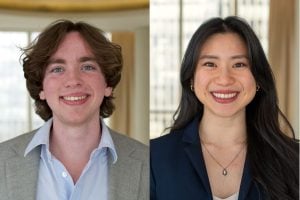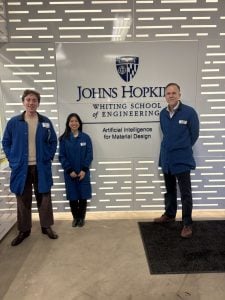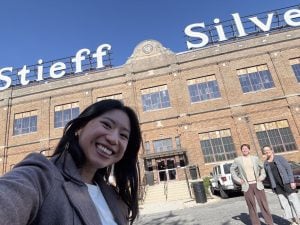
When Sabrina Shen (Engr ‘19) and Sam Walton Norwood (Engr ‘19, MSE ‘20) started their first years at Johns Hopkins, neither thought they’d end up in the Department of Materials Science and Engineering. Now graduates of the program, they’ve started careers at Mirror Physics, a New York-based startup co-founded by Norwood, focusing on the emerging field of AI in materials science and chemistry.
“I started in the Department of Chemical and Biomolecular Engineering because I was initially interested in making new medicines,” says Norwood. “I added materials science as a second major because I found the concepts interesting and could gear my chemistry knowledge towards creating new materials instead of medicines.”
Shen also joined materials science and engineering in her sophomore year, making the switch from sociology. “I fell in love with the field and found it as a way to learn about the world around me; materials make up everything, so I found their study to be an insightful lens for understanding and interacting with the world,” she says. She met Norwood that year, befriending him along with other students in their graduating class.
Norwood’s interest in computational materials science and AI started while he was a student at Hopkins and carried into his postgraduate studies.
“My senior project focused on computational simulation of materials for energy storage, which I carried into my master’s at Hopkins,” says Norwood. “In my post-graduate work I was part of the first wave of applying modern large-scale deep learning, like generative modeling, to computational chemistry and materials science.”
Deep learning is the modern way of developing AI that has led to breakthroughs such as ChatGPT. Unlike older machine learning methods—which rely on manually engineered features and structured data sets—deep learning uses highly flexible models and computing capable of learning complex patterns from unstructured data. For materials science purposes, these models can process terabytes of data to learn the underlying physical relationships governing material behavior, helping scientists predict how materials function under certain conditions and accelerating the discovery of new materials.

Sabrina and Sam visit the Artificial Intelligence for Materials Design (AIMD) Lab with Professor Todd Hufnagel
“We felt there was a unique opportunity to build a company around AI for materials science and chemistry researchers, whether in academia or industry,” says Norwood. “So, I teamed up with two of my closest friends – Kayvon Tabrizi, a fellow alumnus from the Whiting School of Engineering, and Kevin Lee, whom I’ve known since high school, and founded Mirror Physics.”
Shen’s curiosity about AI grew during her doctoral studies at the Massachusetts Institute of Technology. After gaining more experience with AI for materials science, she joined the team as soon as she finished her PhD. “My thesis focused on the design of bio-based materials for sustainability. The lab I joined sat at the intersection of experimental and computational approaches, which continue to influence my approach to AI for science,” she says.
While she was earning her PhD, she attended the 2024 Materials Research Society (MRS) Spring Meeting and Exhibit in Seattle, Washington, where she reconnected with Norwood. They kept in touch until the next year, after Mirror Physics was founded, and met to discuss the future of the company.
“It was the right people and the right opportunity at the right time—what Mirror Physics needed most in its early stages was agile team members with strong technical backgrounds and well-connected networks, and I was excited to apply both materials and interdisciplinary expertise towards building something with revolutionary potential in the sciences,” she says.
Since its founding in 2024, Mirror Physics has aimed to design systems to accelerate research and development, predicting outcomes in materials science and chemistry.
“Our goal is to create a frontier AI for materials science and chemistry, and to make it accessible to all scientists so that we can drive innovation in sustainability, health care, and other sectors,” says Shen. “We’re currently building several tools, including foundation models for chemical simulation and a self-driving lab, which is a lab that completes experiments using AI and machine learning.”

Sabrina and Sam visit the Stieff Silver Building with Professor Orla Wilson
Starting a new company comes with a unique set of challenges, as each day presents new opportunities, specifically in the AI field.
“AI for scientific discovery is a big, nebulous space right now. We know there are a lot of opportunities and excitement,” says Shen. “A startup employee must be flexible and see the big picture of where the company can go – there’s a huge emphasis on adapting to the market, while paying attention to opportunities on the horizon.”
Their time at Johns Hopkins laid the foundation for the skills they have today. They credit their professors, specifically Associate Teaching Professor Orla Wilson and Professor Hai-Quan Mao, who played pivotal roles in shaping their minds and influencing their career paths.
“Our professors taught us the importance of lifetime learning, of always challenging ourselves and staying curious, and granted us a lot of intellectual freedom to figure out challenging problems,” says Norwood. “Seeking out opportunities and thinking independently are some of the greatest lessons I learned at Hopkins that have benefited me most in my career.”